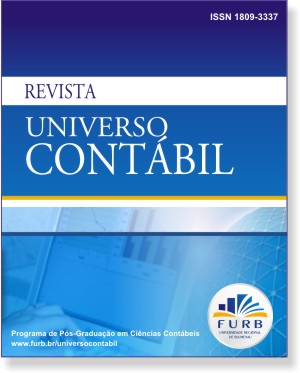PERCEPÇÃO DE DOCENTES DE CURSOS DE GRADUAÇÃO EM CIÊNCIAS CONTÁBEIS SOBRE A FUNÇÃO E ATUAÇÃO DO COMITÊ DE PRONUNCIAMENTOS CONTÁBEIS
DOI:
https://doi.org/10.4270/ruc.20117Palavras-chave:
Normas contábeis. Comitê de Pronunciamentos Contábeis. Docentes.Resumo
Este estudo tem como objetivo analisar a percepção de docentes que lecionam nos cursos de graduação em Ciências Contábeis do Brasil em relação à função e atuação do Comitê de Pronunciamentos Contábeis (CPC). Os resultados estão baseados na percepção de 190 professores sobre a função do CPC e sua atuação (Estudo I) e sobre a importância do CPC para a profissão contábil (Estudo II). Trata-se de uma pesquisa descritiva, realizada por meio de levantamento. Para análise dos dados recorreu-se a estatística descritiva e qui-quadrado de Pearson (Teste c2). Com este último foi possível verificar se variáveis categóricas como região, titulação, idade, gênero, instituição em que trabalha, disciplina que leciona, ser docente de dedicação exclusiva ou ter junto outra profissão influenciaram nos padrões de respostas observados. No tocante ao Estudo I, grande parte dos docentes reconhece o CPC como entidade de classe responsável pela convergência no país, contribuindo, assim, para a melhoria da qualidade da informação contábil. A avaliação do órgão foi considerada boa, realizando um bom trabalho rumo à convergência. Os docentes não concordam que o Comitê simplesmente traduz as normas internacionais. Todavia, não existe consenso entre os professores em relação ao fato de que a velocidade com que as normas são publicadas pode estar prejudicando as discussões sobre a convergência. O Estudo II mostrou que a maior parte dos docentes concorda que o órgão permite maior participação da classe contábil na elaboração de padrões de contabilidade, o que irá fortalecer a classe contábil, atribuindo-lhe autoridade substantiva.
Downloads
Downloads
Publicado
Como Citar
Edição
Seção
Licença
Os direitos autorais para artigos publicados nesta revista são do autor, com direitos de primeira publicação para a revista. Em virtude de aparecerem nesta revista de acesso público, os artigos são de uso gratuito, com atribuições próprias, em aplicações educacionais e não-comerciais. A revista permitirá o uso dos trabalhos publicados para fins não-comerciais, incluindo direito de enviar o trabalho para bases de dados de acesso público. Os artigos publicados são de total e exclusiva responsabilidade dos autores.
• O(s) autor(es) autoriza(m) a publicação do artigo na revista;
• O(s) autor(es) garante(m) que a contribuição é original e inédita e que não está em processo de avaliação em outra(s) revista(s);
• A revista não se responsabiliza pelas opiniões, ideias e conceitos emitidos nos textos, por serem de inteira responsabilidade de seu(s) autor(es);
• É reservado aos editores o direito de proceder ajustes textuais e de adequação do artigo às normas da publicação;
• O(s) autor(es) declaram que o artigo não possui conflitos de interesse.


